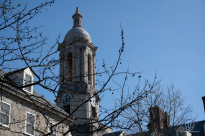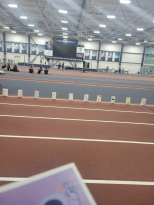Reporting from Greece
Homeward bound
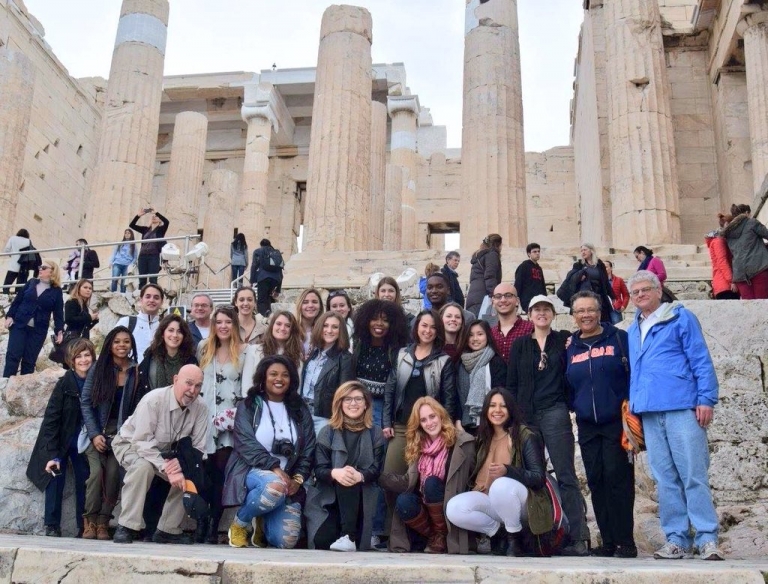
March 12, 2016 — Students and faculty from Penn State University and Morgan State University stand for a group photo before departing from Greece to return to State College and Baltimore, respectively. The two groups spent spring break reporting on refugees, the economy and other topics in Greece.
Free haircuts and an afternoon of conversation
March 11, 2016 — The perimeter of Schisto camp is wrapped in plastic tarps to provide refugees a little privacy. Inside, more than 2,000 people live in white tents that have the instantly recognizable logo of the United Nations Higher Commission for Refugees (UNHCR).
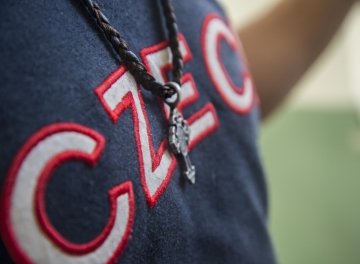 This pendant is one of the few personal items that Murtaza Ostorh was able to bring with him from Iran. Photo by Min Xian
This pendant is one of the few personal items that Murtaza Ostorh was able to bring with him from Iran. Photo by Min XianSchisto is a former military base located in an industrial park on the west side of Athens, roughly nine miles away from the city center. It has been transformed into a refugee camp by an influx of people fleeing war and economic hardship. It is operated by the Greek military, under the authority of the Greek government. Convoys of olive colored military trucks maneuver in and out of the gateway to the camp, bringing medical supplies and food.
The camp is connected to Athens by a single bus line, which is how most of the refugees arrive.
Murtaza Ostorh operates a barber shop in a little brick house in between the enormous temporary tents, next to an L-shaped one story building that used to be a mess hall, but now serves as a bunk house, medical center and community kitchen.
The paint on Ostorh's barber shop used to be light green, but a deep coating of dust has turned the painted brick a rusty shade. It was designed to be a multi denominational chapel, but when it turned out that most people preferred their prayers done outdoors, Ostorh was given the space.
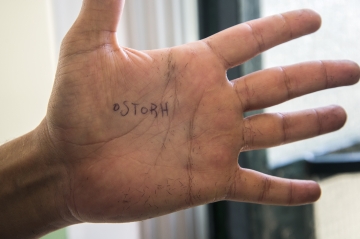 Murtaza Ostorh demonstrates the correct spelling of his last name. Photo by Min Xian
Murtaza Ostorh demonstrates the correct spelling of his last name. Photo by Min XianOstorh communicates through an interpreter, because openly learning or speaking English is considered a crime where he used to live, in Shiraz, Iran.
He says he fled his own country because he "had problems with the government." Ostorh did not leave his skills behind. He now serves the people in Schisto by providing haircuts. Greek law dictates that refugess cannot earn money, so all of his work is free.
With the practiced choreography honed over the ten years he has been a barber, Ostorh does about 10-15 haircuts a day. A customer sits down and Murtaza wraps an apron around his neck. Twenty minutes later he's done.
"I have fallen in love with the work," Murtaza says. His voice is a monotone but his eyes are concentrated and filled with purpose. “I am a servant of everyone -- not just Iranian, Syrian or Afghanistan -- everyone of peace," he said, “and I will continue the work."
~ video and text by Min Xian
On the move
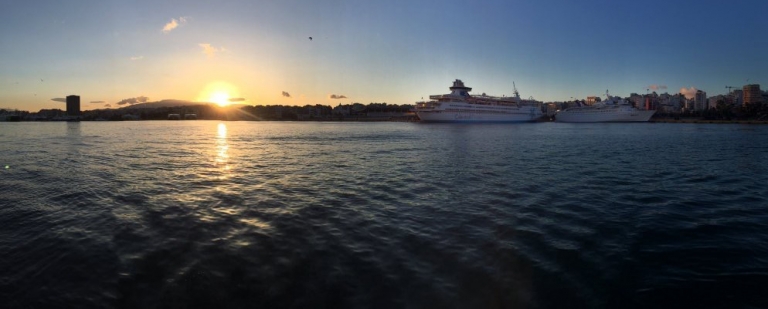
March 10, 2016 — (via Twitter): Sun rising over Piraeus harbor in Greece. We left Lesvos on a ferry with refugees to head to Athens.
More Tweets by the reporting team at #PSUGreece
~ photo by Taylor Bisacky
Demonstrating their desire to leave
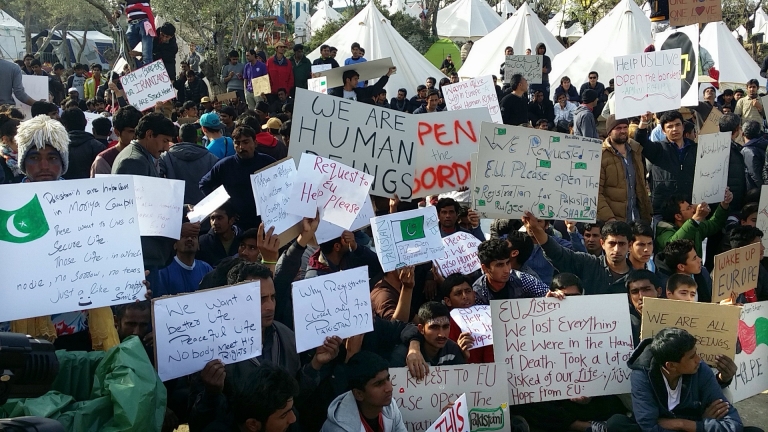
March 8, 2016 -- Refugees and volunteers stage a demonstration on Tuesday, March 8 calling for the European Union to open the closed borders and allow registration for all nationalities. The protest took place at Better Days for Moria; an unofficial refugee camp located directly adjacent to an official camp named Moria.
The official Moria is a large, official refugee camp located just outside the centre of Mytilene, the main town on the island of Lesbos, Greece. The camp also serves as a registration center for refugees seeking asylum.
Lesbos is an island located to the east of the Greek mainland and approximately six miles West of the Turkish mainland. Due to its large size relative to other islands in close proximity with Turkey, it is the largest recipient of refugees crossing the Aegean sea from Turkey to Greece.
Syrian refugees comprise nearly half of all asylum seekers crossing Greek borders. Due to the civil war in their country, they receive priority as asylum seekers in the European Union. Other nationalities, such as Afghanis, Pakistanis, Iranians, Moroccans and Algerians, however, often become trapped within Greece.
The majority of refugees do not wish to stay in Greece as it continues to suffer from an economic crisis. Instead, they hope to settle in a Western European country. The most popular destination is Germany.
~ photo and text by Yousef Saba
Music in the air
March 6, 2016 — After the festivities of Carnaval wound down in Athens, there was a small musical performance in the Anakata cafe tucked in the urban neighborhood of Petralona. Markos Kontos on guitar, Gregory Laggas on violin, Dimos Marinidis on percussion and Christos Aggelopoulos on the accordion played lively Greek music together late into the evening.
~ text and video by Haley Nelson
An outpouring of donations
Supplies are being collected at Syntagma Square in Athens to help meet the basic needs of the refugees who are streaming into Greece. Part of the donations will be taken to the Macedonian border and the rest to places where refugees are coming ashore.
~ video report by Megan Caldwell
Forgotten people
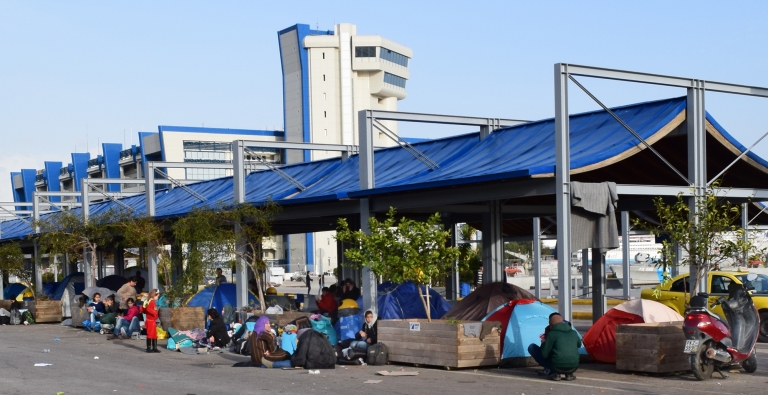
March 8, 2016 | ATHENS — Sami Popal held his one-year-old son, Murtaza, tightly in his arms as he recounted the last month of his family’s life and the ordeal that brought them from their comfortable home in Kabul, Afghanistan to a makeshift camp of tents and mattresses outside a ferry terminal south of Athens.
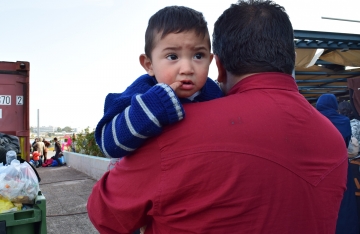 One-year-old Murtaza Popal, peers around at his surroundings from teh arms of his father, Sami Popal, 38, of Kabul, Afghanistan. They were standing outside a refugee camp at the E1 terminal of Athens' Piraeus port. Photo by Lauren Blum
One-year-old Murtaza Popal, peers around at his surroundings from teh arms of his father, Sami Popal, 38, of Kabul, Afghanistan. They were standing outside a refugee camp at the E1 terminal of Athens' Piraeus port. Photo by Lauren BlumPopal, 38, recalled the storms on the night he and 15 members of his extended family crossed the Aegean Sea by boat from Turkey to the Greek island of Samos. That night, he said, everyone on the boat accepted that they would die.
But the storm passed and the small battered boat arrived in Samos, one of Greece’s most popular tourist islands, known for its lush scenery and relaxing beaches.
When after a couple of days the group left Samos and arrived in Piraeus last week, Popal was relieved, thinking that at last the most difficult portion of this family’s journey was behind them.
But upon arrival in Greece’s major port, eight miles south of Athens, he learned that Afghans were no longer permitted to cross the Greek-Macedonian border -- the main route for refugees seeking to settle in Northern Europe – along with refugees from other countries like Syria and Iraq.
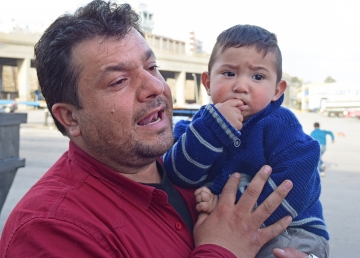
“We are the forgotten people,” says Sami Popal, holding his one-year-old son Murtaza. Photo by Lauren Blum
“We are the forgotten people,” Popal said. “The European leaders already forgot about us. They don’t think we are human.”
At the Piraeus port, where thousands of refugees have turned three ferry terminals and a warehouse into makeshift camps, Afghan people have been growing increasingly frustrated. On Sunday, they held peaceful demonstrations, blocking traffic and chanting pleas for the border to be reopened.
Leaders of Sunday’s demonstrations, including 23-year-old Afghan migrant Asef Fraiz, are threatening more severe measures, including a camp-wide hunger strike, if the border remains closed.
They had hoped discussions at Monday’s EU-Turkey summit would yield good news for them. Instead European leaders delayed an official decision for at least 10 days.
Afghans stranded in the camps in Greece say that they have become frustrated by the government’s differentiation between refugees from Afghanistan and those from Syria, most of whom are still allowed to cross the border.
“Afghanistan has had 14 years of war. Syria has had four years of war,” said 18-year-old Ahmad Farhad, an Afghan refugee who spent two weeks walking through Turkey before boarding a small, overcrowded fishing boat.
Popal said that an Iraqi family and a Syrian family had camped near his family one night, but on the following morning they were picked up and given transport to the border while his family was left behind. Popal said he has seen many other Syrian and Iraqi families leave for countries to the north during the week that his family has been camped at the port.
Popal said he is not certain how long his family will remain here. But in a family meeting the other night, they vowed not to return to Afghanistan, no matter what happens with the Macedonian border.
“I promised my children safety and a good education,” Popal said. “[If we return,] how can I explain that to my children?”
The decision to leave
In Kabul, Sami Popal and his wife Farzani had a two-story home, a nice car, and good jobs. He worked as a financial adviser for the United States Agency for International Development. She was an internal auditor at a bank.
Popal said he had never thought about leaving Afghanistan until he began to receive calls from an unknown person, who told Popal that if he did not reveal private USAID information to them they would harm him and his family. He changed his phone number, but the person continued calling, he said.
One day, one of his children’s friends was kidnapped from the front yard of Popal’s home. He said he believes whoever had been threatening him had mistakenly kidnapped the child, thinking he was one of Popal’s sons.
When that occurred, Popal said, he immediately quit his job, sold his car and left everything he had in Afghanistan. In order to find a boat to Greece, Popal’s family had to walk to Turkey from Iran.
One of the most difficult days, he said, was when his family had to wade through a freezing cold river to cross the border between Iran and Turkey. It was snowing, he said, and painful for them to wade through the icy water.
During the journey, Popal said he was constantly worried for his children’s safety, but he never showed it.
“I don’t show them that I’m worried, that I’m scared for the children,” Popal said. “If I lose my hope, then what will happen to my children.”
Since arriving at the port last week, Popal, his wife, and five children, who are between the ages of one and 10, have slept in one tent, which was given to them in Samos. They have not showered, Popal said, as there are no bathrooms at the camp. He has been wearing the same pair of jeans since he left Kabul a month ago.
Ultimately, Popal hopes to end up in Germany, where he can get a job and his children can receive a good education. He would stay in Greece, he said, but he worries about the language barrier. He said he does not know how his children, who speak Farsi, could continue their schooling in Greece.
Popal’s main priorities for his children, he said, are education and safety, two things that are rare in Afghanistan. He spoke of his journey stoically, getting emotional only when discussing what he would do if the border does not open for them.
“This is a difficult question,” he said, his eyes watering.
Ayren-Marie Kelly, a volunteer at the camp who leads a team of interpreters trying to provide refugees with resources, said they have been advising Afghan refugees to take the subway to a nearby town where they can claim asylum in Greece.
Kelly, 25, of England, has been working at the camp since December, when news of the escalating crisis made her cut her European backpacking trip short and stay in Greece to volunteer.
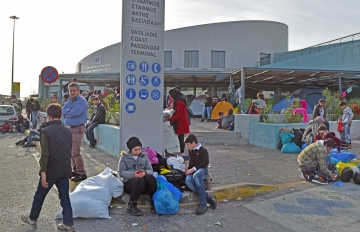 Refugeess camp at Piraeus, Athens' main port, awaiting news of whether the Greek-Macedonian border will close. Photo by Lauren Blum
Refugeess camp at Piraeus, Athens' main port, awaiting news of whether the Greek-Macedonian border will close. Photo by Lauren BlumWhen Kelly first arrived in Piraeus, most refugees spent only a few hours there, she said. They would arrive on the ferries from the islands and quickly be bused to the Macedonian border.
As border controls became more severe, and conditions worsened, buses for the refugees stopped coming to Piraeus as frequently, she said. More refugees chose to stay at the port out of fear they would be turned away or face violence at the Macedonian border.
Kelly worried about the possibility of the border’s closure. “It’s going to become a black hole here,” she said.
If he could speak to European leaders, Popal said, he would stress to them that Afghan people are human, just like Syrians and Iraqis. All they want is a safe life for themselves and their families.
“When you pass through dangerous areas and think you might die, you’re not coming here for the sightseeing,” Popal said.
He said he and other Afghans at the camp became angry when they heard word that Monday’s summit had resulted in no decision on the border.
“When we started the journey, we said, ‘Let’s go to Europe. They’re kind people,” Popal said. “When we got here, we saw the [volunteers] are kind, but not the government.”
~ by Erin McCarthy
Carnival!
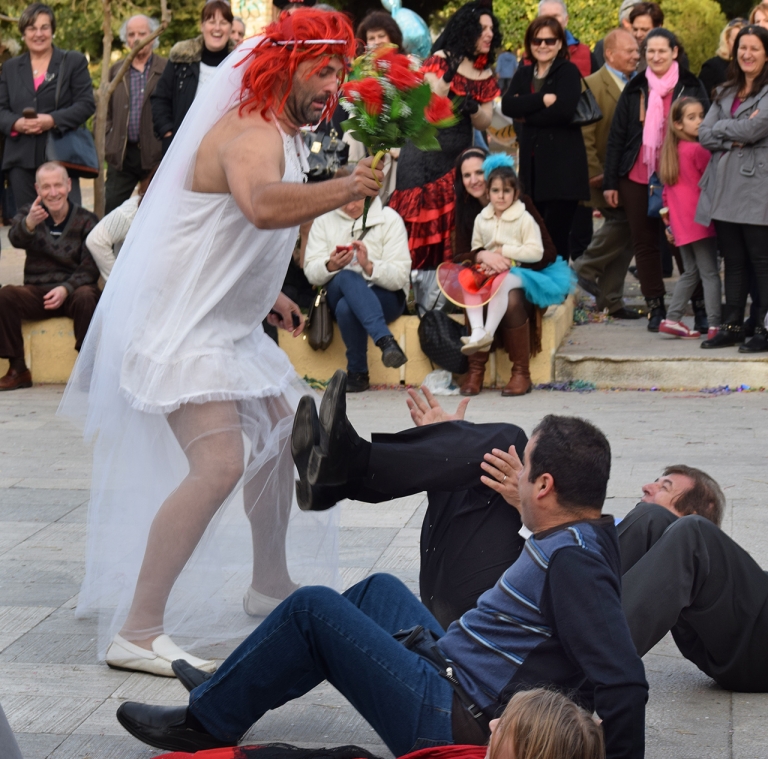
March 6, 2016 — Carnival is a colorful three-week celebration for the community in Agia Paraskevia to come together, enjoy and indulge before the Greek Orthodox Church’s 40-day Lenten season.
Protest
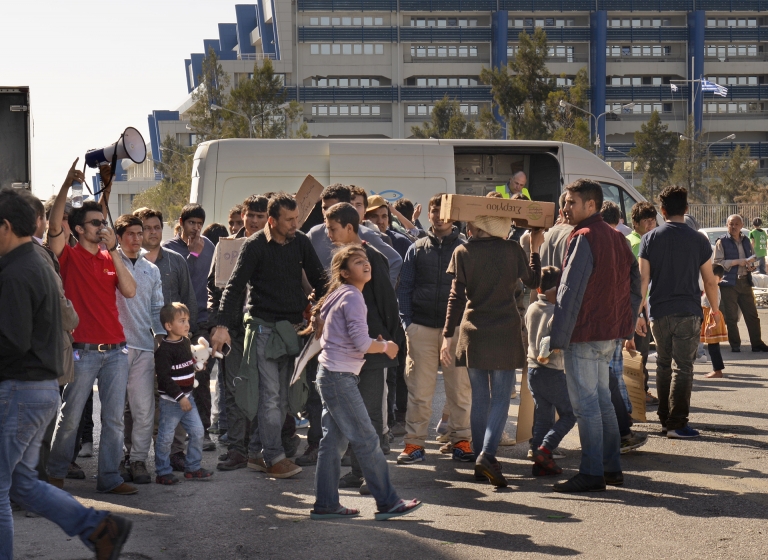
March 5, 2016 — A demonstration at Piraeus Port.
Heading to Greece
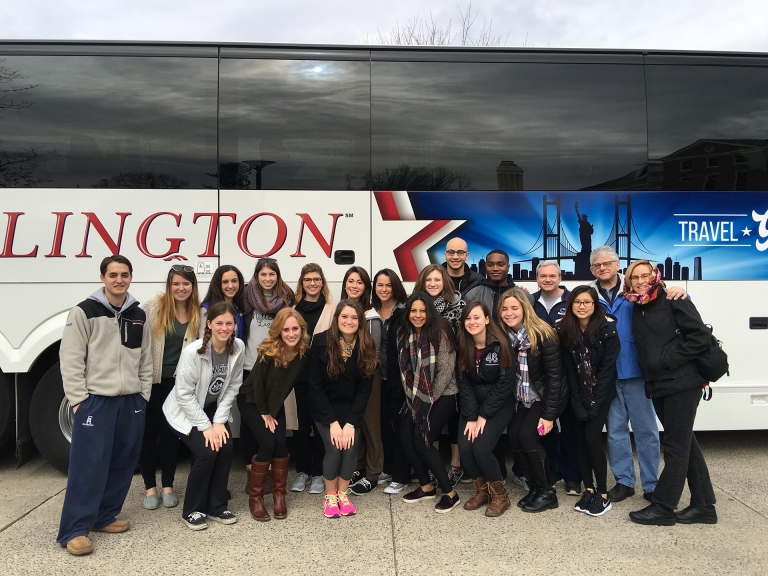
March 3, 2016 — Early this morning 18 students and four faculty from COMM 402 International Reporting boarded this bus on the first leg of their trip to Greece to cover the refugee crisis there.





